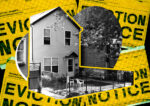The Illinois Appellate Court has ordered the Chicago Housing Authority to reinstate the housing subsidy for a North Side Chicago woman previously accused of defrauding the federal Paycheck Protection Program.
The decision comes after a Cook County judge upheld the CHA’s revocation of her rent-subsidy voucher, citing the woman’s involvement in obtaining $42,000 in PPP loans despite not owning a business, the Chicago Sun-Times reported.
The woman’s ordeal began in 2020 when a broker on Facebook offered to help her secure PPP funds intended for businesses affected by the pandemic. The broker filled out applications that resulted in the woman receiving forgivable loans of $21,000 in 2020 and 2021. She admitted to kicking back a portion of this money to the broker.
In 2022, the CHA accused her of fraud and revoked her housing assistance, which she had relied on since 2014. Although she admitted to receiving the loans and splitting the proceeds with the broker, she argued in court that she was an “unwilling victim” who made “unintentional mistakes,” believing the funds were grants that did not need to be reported to the CHA.
The appellate court found insufficient evidence to prove she intentionally scammed the PPP program, leading to the reinstatement of her housing voucher. This case is part of a broader pattern of PPP loan fraud that has plagued the program nationally, resulting in significant financial losses.
More than 8,800 people with CHA vouchers or living in public housing in Chicago obtained over 10,000 PPP loans, totaling more than $190 million, according to CHA Inspector General Kathryn Richards. Authorities suspect a substantial portion of that amount was obtained fraudulently. As of last August, about 40 people had their vouchers revoked due to suspicions, with ongoing investigations potentially impacting more.
The issue extends beyond CHA recipients. The Illinois Office of Executive Inspector General investigated approximately $275,000 in PPP loans received by 12 Illinois Department of Human Services employees, leading to the dismissal of 12 workers. These employees, primarily mental health technicians, falsely claimed to be sole proprietors of businesses, and they paid brokers kickbacks to secure the loans.
One employee admitted to inflating her income to obtain a $20,832 loan and paying a $4,000 kickback to a tax preparer, the outlet reported. While these individuals faced consequences, brokers who facilitated the fraudulent loans have largely escaped punishment due to the recipients’ reluctance to name them and the focus of investigations on loan recipients.
Nationwide, prosecutions of brokers involved in PPP fraud have been rare. However, a notable exception includes three California tax preparers convicted of causing $44 million in losses through fraudulent PPP loans and false tax returns.
—Quinn Donoghue
Read more



